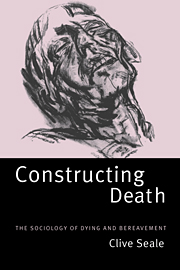7 - Falling from culture
Published online by Cambridge University Press: 28 October 2009
Summary
In the third part of this book I will show the extent to which people participate in the dominant cultural scripts, described in part II, as they approach death. The impact of these is not universal, as one might expect in a situation where there are competing voices and cross-cultural variations. Within anglophone countries ethnic and class differences in participation will be demonstrated. Others, such as gender and age differences, also exist and will be alluded to. A script of resistance to revivalist discourse will be identified. The role of bodily constraints in limiting opportunities for participation will also be demonstrated. The third part of this book, then, presents an account of the ageing, dying, grieving, embodied individual, in everyday life enmeshed in social bonds, experiencing a final fall from culture. We begin, in this first chapter, by presenting an account, which some readers may find harrowing, of the dissolution of the social bond that is involved in dying. For in order to understand what it is that human beings have constructed, we need to see what it is they can lose.
The maintenance of the human social bond is ‘the most crucial human motive’ (Scheff 1990: 4), yet dying is a severance of this. In spite of symbolic attempts to transform death into hopes of immortality, to create a sheltering canopy of culture against nature, for people facing death these human constructions appear fragile.
- Type
- Chapter
- Information
- Constructing DeathThe Sociology of Dying and Bereavement, pp. 149 - 171Publisher: Cambridge University PressPrint publication year: 1998
- 1
- Cited by



